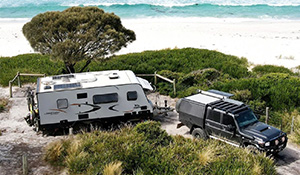Hybrid option added to Land Rover Discovery Sport and Range Rover Evoque

Land Rover have announced a plug-in hybrid engine option for the Land Rover Discovery Sport and Range Rover Evoque.
The new PHEV variants of Land Rover’s two best-selling models offer exceptional economy, according to Jaguar Land Rover’s Executive Director of Product Engineering, Nick Rogers: “The combination of electrification, downsizing and lightweighting gives impressive fuel consumption, electric range and zero-emissions urban driving. Whether driven longer distances, off-road or around town, our latest plug-in hybrid offers the same great Land Rover capability and composure with all-electric driving and world-class efficiency.”

Welcome P300e
The next step in Land Rover’s electrification plans following the release of a 48-volt mild-hybrid system, the plug-in hybrid Discovery Sport and Evoque, badged P300e in both instances, combine a 147kW three-cylinder Ingenium turbo petrol engine with an 80kW electric motor on the rear axle. The electric motor is powered by a 15kWh lithium-ion battery located under the rear seat.
The same drivetrain is fitted to both vehicles, with total maximum outputs of 227kW and 540Nm from each.
Matched to an eight-speed automatic transmission, the P300e hybrid drivetrain can operate the combustion engine-only, electric-only or a combination of both. The preferred power can be driver-selected, too, using one of three different driving modes – Hybrid, EV and Save.

HYBRID is the default mode that automatically combines power from the electric motor and petrol engine, but adjusts output to suit driving conditions and remaining charge in the battery. Once a destination is entered in the vehicle’s navigation system, the inbuilt Predictive Energy Optimisation technology integrates route and GPS data to maximise efficiency for the journey.
EV mode runs the vehicle off the electric motor only, for zero-emission journeys, while SAVE mode prioritises the turbo petrol engine as the main power source, while also maintaining battery charge at a chosen level.

On electric power alone, the Land Rover Discovery Sport P300e has a 62km range, with the Range Rover Evoque P300e offering a claimed 66km electric-only range.
For recharging, a ‘Mode 2 Home Charging Cable’ allows full charge from a standard domestic power outlet in 6hrs 42mins, while a ‘Mode 3 Charging Cable’ for a 7kW AC wall box or AC public charge points enables charging from 0-80 per cent in 1hr 24mins. Using a public DC charge point, 80 per cent charge is capable in as little as 30 minutes.
Claimed fuel economy from the PHEV drivetrain is as low as 1.4lt/100km for the Evoque P300e and 1.6lt/100km for the Discovery Sport P300e. CO2 emissions are likewise substantially reduced, with a claimed 32g/km for the Evoque and 36g/km for the Discovery Sport.

All this efficiency doesn’t come at the expense of performance or ability, according to Land Rover. The Evoque P300e is capable of reaching 100km/h from standstill in 6.4 seconds, while the Discovery Sport P300e hits 100km/h in 6.6 seconds. Both can reach speeds of up to 135km/h using electric power alone. Above this speed, the electric motor is automatically decoupled to reduce drag and improve efficiency.
Even though the Discovery Sport and Evoque are “tarmac” SUVs, Land Rover’s signature off-road capability is said to be uncompromised in the PHEV versions as the ‘Premium Transverse Architecture’ underpinning both models was designed with electrification from the outset.

In Harmony with PHEV
While the platform is designed to handle electrification, other componentry has been adjusted to suit.
A high-voltage junction box under the front seats comprises the DC:DC converter and the 7kW on-board charger used to charge the hybrid battery when the vehicle is plugged in. Next to this is the Belt-integrated Starter Generator Inverter which, through intelligent electrical management, can send recovered energy to the battery for storage or for immediate redeployment to support full all-wheel drive capability.

Replacing the traditional brake vacuum servo is a new brake-by-wire system that blends regenerative and friction braking to provide what Land Rover says is consistent and precise pedal feel. The system can deliver up to 0.2g of deceleration under regenerative braking, maximising energy efficiency by using the vehicle’s kinetic energy to recharge the battery.
To get the most out of the PHEV, the InControl Remote smartphone app allows monitoring of the vehicle’s charge status and can prep the vehicle for the journey ahead or even set a charging timer to take advantage of off-peak energy tariffs.
Additionally, the battery can be pre-conditioned and the cabin temperature can be set using this app while the vehicle’s still plugged in - rather than when you start driving – to reduce drawing energy from the battery when the journey’s underway.

In Australia in 2021
Following their reveal in April, the Range Rover Evoque P300e and Land Rover Discovery Sport P300e have been pencilled in for an Australian release in Q2, 2021. Full specs, options and pricing will be revealed closer to local launch.










